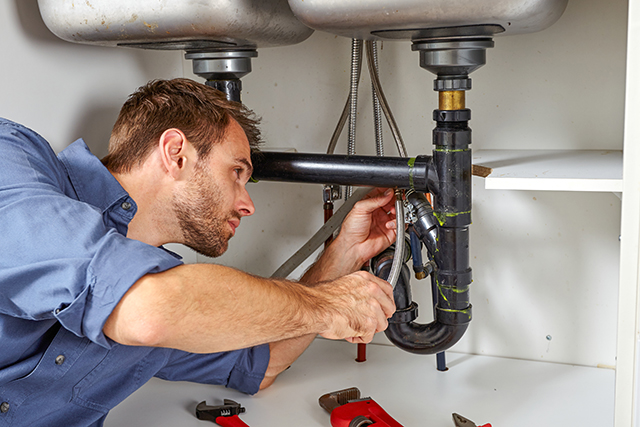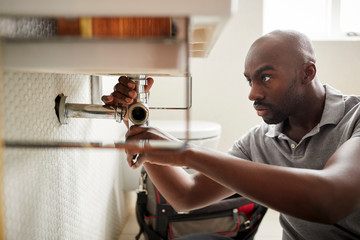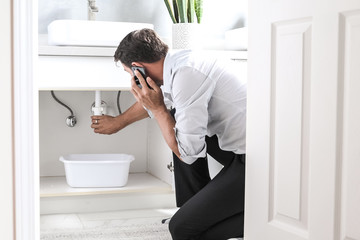Becoming a Plumber
Plumber In Akron install, repair and maintain pipes, fixtures, and appliances that facilitate water distribution and wastewater removal in residential, commercial, and industrial settings. They use their skills to solve problems, make recommendations and ensure plumbing systems meet standards and regulations.
They also work with clients, requiring excellent customer service skills to listen to their concerns and address issues. Plumbers are typically licensed, completing years of education and training as well as apprenticeship programs.

As in any skilled trade, education is essential for becoming a plumber. This career requires a strong knowledge base, including an understanding of physics and science related to water flow, as well as building regulations. Plumbers also need to be creative problem-solvers, capable of quickly and efficiently addressing issues that could range from minor leaks to complex system failures.
The path to becoming a plumber can be through a formal apprenticeship with a union or trade organization, a vocational program, or a college degree program. Most jurisdictions require plumbers to be licensed, so completing any required training and meeting licensing requirements is important.
Plumbers can work in a wide variety of settings, including residential, commercial, and industrial. In residential situations, plumbers install and repair pipes and fixtures, such as sinks, toilets, tubs, and showers. In commercial and industrial environments, plumbers may work on more complex plumbing systems that include fire sprinklers and waste water treatment facilities.
Some plumbers choose to specialize in one area of the field, such as sanitation, air conditioning, or ventilation. These specializations allow them to gain more experience and earn higher salaries. Some plumbers also become instructors or trainers to pass on their knowledge of the trade to aspiring plumbers.
Because plumbers frequently interact with customers, they need to have good customer service skills. This includes being able to listen to the client’s problems, explain them clearly, and find the best solutions. Plumbers are also expected to be punctual and polite when interacting with clients.
Since plumbing technology is rapidly changing, it’s important for plumbers to continue training to stay up-to-date on new technologies and techniques. Continuing education courses are offered by many trade schools and professional organizations. These courses are often available online and can be completed at the plumber’s own pace.
Because of the nature of their work, plumbers must be prepared to deal with hazardous materials. They are often exposed to bacteria, viruses, and fungi that are found in human waste, which can cause illness and even death. For this reason, it’s important for plumbers to maintain proper hygiene and follow all safety procedures when working on sewage and garbage disposal systems.
Many states require plumbers to obtain a license before working in the trade. This process varies widely between jurisdictions, but usually involves completing an apprenticeship, meeting educational requirements, and passing an exam. Plumbers must also pay fees for certification and licensing, which vary depending on the state where they work.
To become a licensed journey plumber, you must complete at least 6800 hours of on-the-job practical hands-on training and pass an exam. You can find out more about these requirements on the State Department of Labor website. The most common route to becoming a qualified plumber is to enroll in an apprenticeship program offered by plumbing companies, trade unions or vocational schools. An apprenticeship lasts about 4 to 5 years and combines classroom study with on-the-job experience. The cost of these programs varies, but is typically less than going to college or university.
Plumbers who want to become licensed master plumbers must complete a minimum of 12 years of experience, including at least two years of service as an apprentice. This experience must include at least one year of work in plumbing, pipe fitting, or steam and heating installation, or plumbing, gas-fitting, or heating repair. You can also substitute directly related academic or technical training for up to half of the required experience. You must also pass a test covering local plumbing codes and business and law.
There are several other requirements for becoming a licensed plumber, including submitting proof of insurance and completing background checks. In addition to these, you must provide affidavits from employers who can attest to your moral character and experience as a plumber. You must also be a legal resident or citizen of the United States and have not been convicted of certain crimes, including theft or fraud.
After you have accumulated the appropriate level of experience and have passed your examination, you can apply for a master plumber license with the City. You will need to have a registered apprenticeship program, workers’ compensation insurance, and general liability insurance. The license period varies between cities, and you must renew it annually.
A plumber’s work environment can vary considerably depending on the type of job, but all plumbing careers involve working with water and other fluids, assembling pipes, and making repairs. Plumbers who specialize in residential work often spend most of their time at people’s homes or apartment buildings, interacting directly with customers to assess their needs and provide estimates for plumbing services. This can be a rewarding career for those who enjoy working with people.
On the other hand, plumbers who focus on commercial or industrial work often spend most of their time in office buildings or other large facilities. These jobs may require collaborating with architects or construction teams to ensure plumbing systems are seamlessly integrated into new building projects. Plumbers who work on large-scale plumbing installations may also be exposed to more hazards than those who repair existing pipes and fixtures. This can include working around hazardous materials such as asbestos, lead, cadmium, silica, and solvents.
As a result, this type of work is not ideal for those who are easily stressed or who don’t enjoy being outdoors or in cramped spaces. In addition, the physical demands of the profession can be challenging for those who don’t have a lot of stamina. Plumbers often need to lift heavy objects and may have to stand for long periods of time while repairing or installing pipes and fixtures. They also have to deal with unpleasant substances such as sewage, which can carry dangerous microbes including cholera, typhoid, and hepatitis.
Overall, plumbers enjoy a high level of job security and satisfaction because their skills are always in demand. They can also expect to make a good salary, especially with increased experience and specialized knowledge. In addition, those who are self-employed can enjoy the flexibility and freedom that comes with being their own boss. However, it’s important for potential plumbers to weigh the pros and cons of this career path carefully before taking on such a demanding job. They should consider their aptitude for the work as well as whether it fits in with their long-term career goals and lifestyle preferences.
It’s no exaggeration to say that our daily lives would be difficult without easy access to fresh water and plumbing systems to eliminate wastewater safely. Plumbers have a crucial role to play in this critical infrastructure, making it a career path with strong job security and earning potential.
A typical plumber’s work day can take them from troubleshooting a leaky faucet to installing and repairing plumbing systems in homes, office buildings, hospitals and more. In addition to addressing everyday plumbing issues, many plumbers also design new plumbing systems for construction projects and work on municipal water supply and drainage systems. Plumbers can also choose to become self-employed by opening their own plumbing businesses, which offers increased flexibility and income potential.
Unlike many other trade professions, becoming a plumber requires little upfront cost and provides a solid return on investment. In fact, after graduating from high school or earning your GED, you can start working in the industry straight away, getting paid while you learn on-the-job skills. Once you’ve obtained your journey-level license, you can progress in the field to become a project manager, inspector or master plumber.
Many people who choose a career as a plumber find it suits their personality, lifestyle and career goals. The work is varied and challenging, and the money is good. As a result, the career is highly popular.
There are plenty of opportunities for plumbers to grow in their fields, with the demand for their services expected to continue growing. In particular, the need for plumbers in new construction is expected to increase as building standards become more stringent and the demand for bathroom remodeling increases. Additionally, employment opportunities for sprinkler fitters should also improve as state regulations change to reflect the increased use of fire suppression systems in commercial and residential buildings.
A successful career in plumbing can lead to lucrative earning prospects, and it’s also a good choice for those looking to avoid the debt that can come with higher education. Moreover, the ability to work on your own schedule and forge relationships with clients is an attractive feature of this trade.



